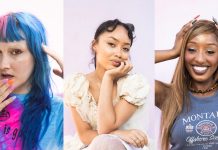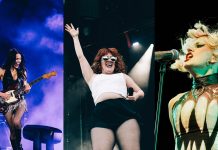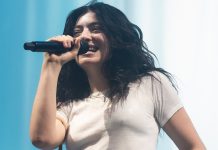For nearly two decades, The Great Escape Festival has been a beacon of the British music industry, the event that signals that festival season has well and truly begun. With roughly 500 bands coming through its doors every May, it’s the place to discover the world-leading bands that will define the next calendar year and to network with the many industry figures who can help turn talent into superstardom. This year, however, things are likely to be a lot quieter along the seaside. The Great Escape has always worked with commercial partners, but this year, its decision to partner with British bank Barclays has drawn mass criticism, due to links with the ongoing war on Palestine.
As reported by the Palestine Solidarity Campaign, Barclays is directly implicated, having invested billions in companies that supply weapons and military technologies to Israel. Since the massacre in Southern Israel on October 7 where more than 1,2000 civilians were killed by Hamas, an estimated 34,000 Palestinians have now been killed in retaliation, sparking usage of the term ‘genocide’. With this in mind, there have been months of lobbying for the Great Escape to cut ties with Barclays, to which the festival has not publicly responded. At time of writing, an estimated quarter of the line-up has pulled out in protest; some of the 126 boycotting bands dropped out very early on, others coming much later, learning from one another and plunging an event that is normally known for opening festival season into last-minute chaos.
In preparing this story, The Forty-Five reached out for comment to both the festival and its promoters, Live Nation, and received no response in time for this publication. Barclays, meanwhile, have a statement on their website which reputes claims that they invest in nine arms-supplying companies, stating that they “trade in shares of listed companies in response to client instruction or demand”.
However, the bands themselves have been very vocal and direct as to why this matters. Bristol punk band The Menstrual Cramps pulled out of The Great Escape back in March, and have been sounding the alarm on Barclays ever since, teaming up with promoter How To Catch A Pig to lead a petition which has raised signatures from a large proportion of the original line up, as well as other big-name allies.

“It is necessary for us, as musicians and just as humans, to stand up for Palestinians, and encourage boycotts, divestment and sanctions, inside and outside the music industry,” says Emilia. “When we became aware of TGE’s partnership with Barclays, we spoke to our label Alcopop! Records about our concerns and ask TGE to drop Barclays and write a statement as to why. TGE did not do this, so two weeks later we went public with our statement.
The response has been generally positive; over 1200 musicians and music industry people have signed the open letter. There is power when we stand in solidarity together as musicians; There is no festival without musicians”.
News of the boycotting campaign reached Manchester rising star DellaXOZ, who this week publicly withdrew from three separate sets at the festival. “The industry needs to be aware that us artists will not be silent and compromise our integrity and values as music doesn’t take precedence over humanity,” she says. “The music industry should not be exploiting the art, labour and hunger of small struggling artists to contribute towards atrocities that the majority of us don’t even align with. The Great Escape potentially could have been a lot of exposure and money for me, but that offer made me realise that I am capable of [attracting] many more of these opportunities; I should take ones up that don’t require me to abandon basic human empathy just to advance myself.
As Della mentions, the decision to pull out of paid gigs isn’t always an easy one to take in 2024, even when you care strongly about the issues at stake. The Great Escape is a huge platform for new artists, and with income channels for grassroots artists feeling scarcer than ever, it can be difficult to turn down that stepping stone, to lose money you don’t really have and may have already spent on rehearsal spaces, kit hire, travel. Given that Barclays also work closely with Isle of Wight, Latitude, Camp Bestival, Capital’s Summertime Ball and more, it’s set to cause mass disruption to gigging bands right across the summer, with significant financial losses.

In a near-viral instalment of his newsletter, the musician Nick Cave responded to an anonymous artist who was wracked with the dilemma of whether to play TGE, citing the ‘few scraps’ that are available to musicians trying to support themselves whilst still wanting to do the right thing: “Integrity is all we have, so how are we expected to navigate through this world when all commercialism and corporate sponsorship comes from darkness?”
Cave’s response was simple: ‘Just play.’
In situations like this, there are a great many cultural commentators who will argue that the music industry is complicit at all levels, and that whilst a boycott is understandable, it’s very hard to exist in a capitalistic society without giving some sort of money to bad-acting business. Others may hope that by choosing to carry on and play, they’ll have an opportunity to call out inhumane practices from ‘within’. But as more and more artists have joined the boycott, it becomes clear that this withdrawal of shows is not just about taking action on an individual level; it’s about showing solidarity to humans both in Palestine and closer to home. Lana Lubany and Tala Yunis are just two UK-based artists with Palestinian heritage who have pulled out of TGE, with the latter expressing their comfort at seeing how thoroughly the issue has been taken up by their musical peers.
Emilia, meanwhile, reminds us that whilst protest can take many forms, speaking out on stage is rarely as effective as withdrawing totally. “The music industry is fucked yes, but saying ‘Free Palestine’ on stage isn’t going to change anything. Withdrawing your labour will make change. BDS have had multiple successful campaigns and boycotts throughout history that can be read on their website. If you want to personally pull out of this whole capitalist hellscape we live in and everything that entails, please do that, I fully support you. However, we are not asking for that. We are asking for a very specific, researched, targeted boycott of Barclays.”
Despite The “Bands Boycott Barclays” campaign focus, the movement around The Great Escape does mirror a wider musical discomfort and uprising regarding the situation in Palestine. Earlier this year, dozens of bands – including Rachel Chinouriri, Sprints, NewDad, and Lambrini Girls — pulled out of SXSW in protest of the festival’s backing of the US army and, by extension, the murder of Palestinians in Gaza by the state of Israel.
Last week, Eurovision went ahead as ‘normal’, but many fans and artists alike have expressed disappointment in Olly Alexander — previously beloved for his LGBTQIA+ activism — for persevering in his decision to represent the UK, despite the organisations’ refusal to ban Israel from the competition in the same way that they banned Russia due to the war on Ukraine. Meanwhile, over on TikTok and Instagram, fans are engaging in an elaborate ‘blocking’ campaign amongst top-tier celebrities who haven’t actively denounced the Israel-Hamas war, hoping to create a powerful demonetising effect.
At time of writing, artists such as Billie Eilish, Lizzo, Taylor Swift and Ariana Grande have all lost tens to hundreds of thousands of followers, with knock-on effects for their advertising visibility.
The issue of violent mass murder is not a matter for debate; very few people can see the hellish images emerging from Rafah and not know in their hearts that a ceasefire is the only way that this nightmare might come close to an end. What fans should do with their musical consumption is perhaps a touch more complex — some people feel that focusing too much on blocking campaigns is distracting from the bigger humanitarian crisis, while others feel that activism in the spaces that they inherently understand and spend money is also important, educating themselves as to exactly where their purchasing power goes. Others still argue that we should be elevating artists who are saying something, rather than wasting energy on denouncing those who are not.
For now, and in the context of The Great Escape, Emilia reminds us that this campaign’s instructions are fairly straightforward and actionable. “Boycott Barclays, don’t bank with them, don’t play festivals that are partnered with them, ask these festivals to cut ties with Barclays, stand together in solidarity,” they say. “Join a union and demand change. Join your local and national protests and direct action groups. Don’t stop until Palestine is free!”
“I feel happy and humbled to be part of a growing and impactful movement, and I know in the grand scheme of things that this was the right thing to do,” agrees Della. “It has made me aware that the music industry is even more complicit than any of us ever imagined, and I will now be researching festivals before I attend so as to not put money in the pockets of evil.”
It will become clearer over the coming days exactly how the festival will respond, but one thing is for certain: grassroots musicians have a voice, and they understand the power of using it.







